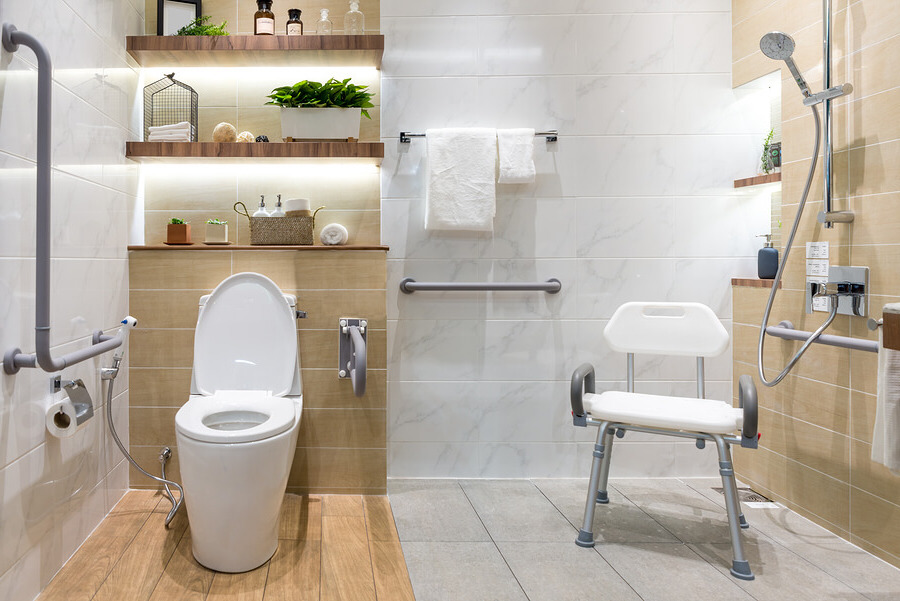Navigating the Medicare Maze: Does It Cover Bathroom Equipment?
When it comes to maintaining independence and safety in everyday life, having the right bathroom equipment is crucial, especially for individuals with mobility challenges or disabilities. Does Medicare Cover Bathroom Equipment? In this article, we will explore the coverage provided by Medicare for bathroom equipment and discuss the eligibility criteria, specific items covered, and the process to obtain coverage.
Understanding Medicare Coverage
Medicare is a government-run health insurance program that primarily caters to individuals aged 65 and older and certain younger individuals with disabilities or end-stage renal disease. It consists of several parts, including Part A (hospital insurance), Part B (medical insurance), Part C (Medicare Advantage), and Part D (prescription drug coverage).
Medicare Part A and Part B, commonly called Original Medicare, are the two main parts covering a wide range of medical services and supplies. However, regarding bathroom equipment, the coverage provided by Medicare is limited.
Eligibility Criteria for Coverage
Medicare will only pay for toilet accessories if certain conditions are met.
Firstly, the individual must be enrolled in Medicare Part B. Secondly, and the equipment must be deemed medically necessary and prescribed by a healthcare professional to treat a specific medical condition or improve the individual’s functional abilities.
Types of Bathroom Equipment Covered by Medicare
Medicare typically covers a select range of bathroom equipment, provided they meet the necessary criteria. Some of the common types of bathroom equipment covered by Medicare include:
- Grab Bars: These are metal bars installed in the bathroom to provide stability and support while maneuvering.
- Raised Toilet Seats: These seats aim to make using the restroom more convenient for those with mobility restrictions.
- Shower Chairs: These chairs offer a safe and comfortable seating option for individuals struggling to stand for prolonged showering.
- Commode Chairs: These portable chairs are used as an alternative to a traditional toilet and are particularly beneficial for individuals with mobility limitations.
- Transfer Benches: These benches allow individuals to safely transfer from a wheelchair to the bathtub or shower without risking falls or injuries.
- Portable Shower Head: Water may be directed more easily by those with limited movement, thanks to the shower head’s pliable hose.
Process for Obtaining Coverage
To obtain coverage for bathroom equipment, certain steps need to be followed. Here’s a general outline of the process:
- Consultation with Healthcare Provider: Discuss your specific needs and limitations with your healthcare provider. Based on their findings, they will examine you and decide if you require any special restroom facilities.
- Prescription and Documentation: If the healthcare provider deems bathroom equipment essential, they will provide a written prescription and any supporting documentation, such as medical records, explaining the medical necessity.
- Supplier Selection: Choose a Medicare-approved supplier that provides the required bathroom equipment. Ensure that the supplier accepts Medicare assignment, which ensures they agree to charge the approved Medicare rates.
- Medicare Coverage Determination: The supplier will initiate a coverage determination request with Medicare on your behalf. This involves submitting the prescription, documentation, and other necessary information to Medicare for review.
- Coverage Decision: Medicare will evaluate the submitted information and make a coverage decision. If approved, Medicare will cover a portion of the cost, typically 80%, and you will be responsible for the remaining 20% as coinsurance.
- Obtaining the Equipment: The supplier will provide the approved equipment once the coverage decision is made. You may need to pay any applicable deductible, coinsurance, or copayment at this stage.
Coverage Limitations and Considerations
Although Medicare covers some bathroom aids, there are exceptions and details to remember. The Medicare durable medical equipment (DME) program includes funding for necessary restroom equipment. DME, or durable medical equipment, is defined as a piece of equipment that may be utilized in the comfort of one’s own home to treat a medical condition.
Medicare coverage for bathroom equipment is subject to certain conditions. The equipment must be deemed medically necessary, meaning it is required to treat a specific medical condition or improve the individual’s functional abilities. It is crucial to have documentation from a healthcare provider clearly stating the medical necessity of the equipment.
It’s also important to understand that Medicare may only cover a portion of the cost. Typically, Medicare Part B covers 80% of the approved amount for DME, and the individual is responsible for the remaining 20% as coinsurance. Additionally, a deductible may apply before Medicare coverage kicks in. It’s advisable to review your Medicare plan and consult with your healthcare provider or Medicare representative to understand your specific coverage details and potential out-of-pocket costs.
Alternative Medicare Coverage Options
While Original Medicare (Part A and Part B) has limitations regarding bathroom equipment coverage, alternative coverage options are worth exploring.
Medicare Advantage (Part C) plans, offered by private insurance companies approved by Medicare, provide an alternative to Original Medicare. These plans often include additional benefits beyond what Original Medicare offers, which may include coverage for bathroom equipment. Medicare Advantage plans have their own coverage rules and guidelines, so it’s important to review the plan’s documentation or speak with a representative to understand the specifics of bathroom equipment coverage.
Another option is to consider supplemental insurance, such as a Medigap policy, to help cover the gaps in Original Medicare coverage. Private insurance companies sell Medigap policies and can provide additional coverage for services and items that Original Medicare does not cover. It is important to shop around and choose a Medigap plan that covers the particular bathroom equipment you need because each plan varies.
Documentation and Medical Necessity
To maximize the chances of obtaining Medicare coverage for bathroom equipment, thorough documentation and evidence of medical necessity are crucial.
When consulting with your healthcare provider, be prepared to discuss your specific limitations, challenges, and their impact on your daily activities. Your doctor can prescribe the necessary equipment based on the details you supply.
The documentation provided by your healthcare provider should include detailed information about your medical condition, the functional limitations it imposes, and how the recommended bathroom equipment will address those limitations. It’s important to gather any relevant medical records, test results, or other supporting documents that can help substantiate the medical necessity of the equipment.
Choosing a Medicare-Approved Supplier
When seeking coverage for bathroom equipment, choosing a Medicare-approved supplier is essential. Medicare has specific requirements and standards that suppliers must meet to participate in the program.
To find a Medicare-approved supplier, you can use Medicare’s Supplier Directory on the official Medicare website or contact Medicare directly for a list of suppliers in your area. Ensure that the supplier you choose accepts Medicare assignment, which means they agree to charge the approved Medicare rates for the equipment. This helps prevent unexpected out-of-pocket costs or inflated charges.
Before finalizing your choice of supplier, consider researching customer reviews, comparing prices, and confirming that the supplier offers the specific bathroom equipment prescribed by your healthcare provider.
Conclusion
While Medicare does cover certain types of bathroom equipment, it’s important to understand the eligibility criteria, coverage limitations, and the process involved. Make sure you choose a Medicare-approved supplier and check with your doctor about the equipment’s medical necessity before purchasing. The ability to use the restroom independently and securely is critical. If you know what you’re doing and have the correct information, you can use Medicare to get the necessary medical equipment.
FAQs
Q1. Does Medicare cover the cost of bathroom equipment?
A1. Yes, Medicare may cover certain types of bathroom equipment if they are deemed medically necessary.
Q2. What types of bathroom equipment does Medicare cover?
A2. Medicare may cover bathroom equipment such as grab bars, raised toilet seats, commode chairs, and shower chairs if prescribed by a healthcare provider and deemed necessary for mobility and safety.
Q3. Are there any eligibility criteria for Medicare coverage of bathroom equipment?
A3. A healthcare provider’s prescription for necessary lavatory equipment as part of a patient’s treatment or rehabilitation plan is required for Medicare reimbursement of such items.
Q4. Is a referral required for Medicare coverage of bathroom equipment?
A4. A referral is typically not required for Medicare coverage of bathroom equipment, but a prescription from a healthcare provider is necessary.
Q5. Does Medicare cover the full cost of bathroom equipment?
A5. Medicare generally covers 80% of the approved amount for bathroom equipment. Unless you have supplementary insurance, you will be responsible for the remaining 20% as a copayment or coinsurance.
Q6. Can Medicare cover installation costs for bathroom equipment?
A6. No, Medicare typically does not cover the cost of installation or modifications necessary for using bathroom equipment.
Q7. Are there any limitations on the quantity or frequency of Medicare-covered bathroom equipment?
A7. Medicare coverage for bathroom equipment is based on medical necessity. Your healthcare provider’s prescription and documentation of need will determine the quantity and frequency of coverage.
Q8. Does Medicare cover the rental or purchase of bathroom equipment?
A8. Medicare may cover renting or purchasing bathroom equipment, depending on the specific item and your medical needs. In some cases, rental may be more cost-effective.
Q9. Can Medicare cover bathroom modifications, such as wheelchair accessibility?
A9. Medicare typically does not cover major home modifications, including bathroom accessibility modifications. However, certain state or local programs may offer assistance for home modifications.
Q10. How can I find suppliers who accept Medicare for bathroom equipment?
A10. You can use the “Supplier Directory” tool on the Medicare website, contact Medicare directly for a list of suppliers, or consult with your healthcare provider or durable medical equipment supplier for recommendations on suppliers who accept Medicare for bathroom equipment.





